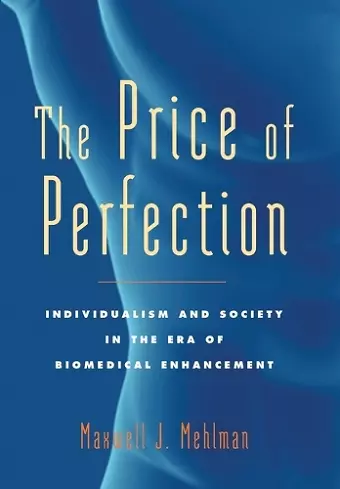The Price of Perfection
Individualism and Society in the Era of Biomedical Enhancement
Format:Hardback
Publisher:Johns Hopkins University Press
Published:17th Jul '09
Currently unavailable, and unfortunately no date known when it will be back

In this book, Professor Mehlman shows precisely why those who oppose most forms of enhancement and optimization are at best confused. American culture constantly sells us the myth of the meritocracy-you deserve what you have because you earned it. The moral foundation of our economic system depends on the persuasiveness of this myth.Drugs that improve performance or level the competitive playing field threaten this core cultural belief. It is, as Mehlman elegantly argues, not so much that bioengineering perfection threatens to undermine fairness but rather that our mythic and fragile view of fairness is so threatened by the latest technologies of improvement. Anyone fascinated by the emerging battle over the morality of perfecting mankind ought to read this book. -- Arthur Caplan, University of Pennsylvania We humans will never be 'perfect,' but Max Mehlman persuasively explains why Americans will nonetheless continue to try whatever we think might make us 'better' and keep us on the road to perfection. -- George J. Annas, author of American Bioethics In The Price of Perfection, Max Mehlman makes it clear that biogenetic enhancement is the human destiny. He provides an insightful tour of not only the pitfalls but also, more important, the tremendous benefits that biomedical enhancement offers humanity. -- Ronald Bailey, author of Liberation Biology: The Scientific and Moral Case for the Biotech Revolution
In the process, he urges the public to face the ethical issues surrounding biomedical enhancement, lest our quest for perfection compromise our very humanity.Few would question the necessity of artificial limbs for amputees. But what of surgery to lengthen the legs of children who are merely shorter than average? Hardly anyone would challenge the decision to prescribe Aricept to people with dementia. But is it acceptable to give the same medication to airline pilots seeking sharper mental focus on long-haul flights? Humans have engaged in biological self-improvement since long before recorded history, from the impotence-curing wild lotus brew of the ancient Egyptians to the herbal energy drink favored by early Olympians. Now biomedical enhancements are pushing the boundaries of possibility and acceptability. Where do we draw the line? How do we know the true ramifications of pioneering medicine? What price are we willing to pay for perfection? Maxwell J. Mehlman's provocative examination of these issues speaks to fundamental questions of what it means to be human. He finds public officials ill-equipped to handle the ethical, scientific, and public policy quandaries of biomedical enhancement. Instead of engaging difficult questions of morality, access, fairness, and freedom, elected officials have crafted toothless and counterproductive laws and regulations. Mehlman outlines policy options to boost the societal benefits and minimize the risks from these technologies. In the process, he urges the public to face the ethical issues surrounding biomedical enhancement, lest our quest for perfection compromise our very humanity.
In his highly readable and especially timely new book, The Price of Perfection, Mehlman makes it clear that he is not at all persuaded that the ethical response to the availability of performance-enhancing drugs in sports-or elsewhere in society, for that matter-is to ban them and then spend a lot of effort testing for those who use them anyway. -- Arthur Caplan Perspectives in Biology and Medicine Bioethicists, as well as policy makers and the public, must think more often and more deeply about science's rapidly growing ability to improve human functioning. But what is present in The Price of Perfection, and sufficiently inspiring, is a well-balanced and well-documented look at how we now are positioned (at least in the United States) to control this process, and what some of the pros and cons of enlarging control, or alternatively loosening it, might be. -- Anita Silvers International Journal of Feminist Approaches to Bioethics
ISBN: 9780801892639
Dimensions: 229mm x 152mm x 26mm
Weight: 658g
320 pages